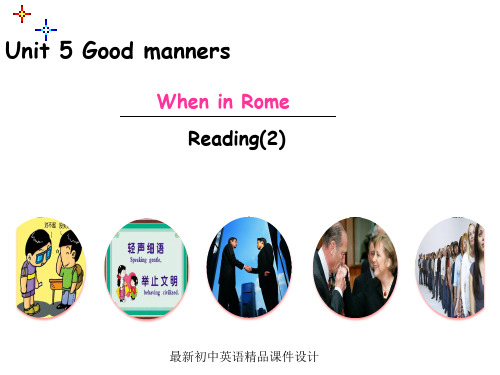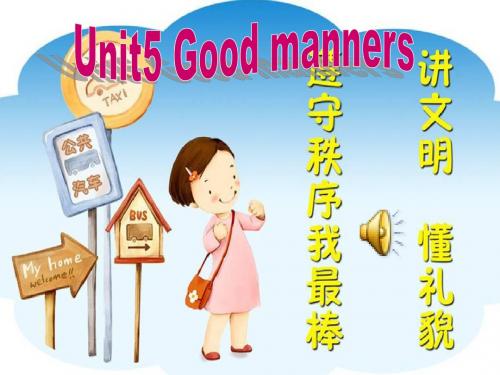【优选整合】牛津译林版八年级下册英语 Unit5 Good manners-reading 测试
- 格式:doc
- 大小:38.50 KB
- 文档页数:3



牛津译林版英语八下Unit 5《Good manners》(welcome)说课稿一. 教材分析《牛津译林版英语八下Unit 5 Good manners》是一篇关于日常礼仪的文章,通过描述不同场景下的礼貌行为,引导学生了解和掌握英语中的礼貌用语和行为规范。
本节课的主要内容是学习日常生活中的礼貌用语和行为,包括问候、道歉、道谢、邀请等。
文章中提供了一系列真实的场景,让学生在实际语境中学习英语,提高他们的语言运用能力。
二. 学情分析在学习本节课之前,学生已经掌握了基本的英语语法和词汇,具备一定的听说读写能力。
然而,对于一些日常礼仪的表达和运用,学生可能还不够熟悉。
因此,在教学过程中,教师需要关注学生的个体差异,针对不同学生的学习需求进行引导和帮助。
三. 说教学目标1.知识目标:学生能够掌握日常生活中的礼貌用语和行为,如问候、道歉、道谢、邀请等。
2.能力目标:学生能够在实际场景中运用英语进行礼貌交流,提高他们的语言运用能力。
3.情感目标:学生能够认识到礼貌的重要性,培养良好的品德素养。
四. 说教学重难点1.重点:学生能够掌握日常生活中的礼貌用语和行为。
2.难点:学生能够在实际场景中运用英语进行礼貌交流,提高他们的语言运用能力。
五. 说教学方法与手段1.情境教学法:通过设置真实的生活场景,让学生在实际语境中学习英语,提高他们的语言运用能力。
2.任务型教学法:通过完成各种任务,激发学生的学习兴趣,培养他们的合作意识和解决问题的能力。
3.互动式教学法:引导学生积极参与课堂活动,加强师生之间的互动,提高课堂效果。
六. 说教学过程1.导入:教师通过与学生互动,引导学生谈论日常生活中的礼貌行为,激发学生的学习兴趣。
2.新课展示:教师展示文章,引导学生阅读,理解文章内容。
3.课堂讲解:教师讲解文章中的重点词汇和语法,帮助学生理解和掌握。
4.实践环节:教师设置真实的生活场景,让学生分组进行角色扮演,实际运用英语进行礼貌交流。



牛津译林版初中英语八年级下册Unit5重点单词、短语、句型、电子书汇总8B Unit5 Good manners【词汇拓展】1. polite adj. → politely(adv.)2. proper adj. → properly(adv.)3. loud adj. → loudly (adv.)4. say v. →saying (n.) 谚语5. discuss v. →discussion (n.)6. park v. →parking (n.) 停车7. polite adj. →impolite (反义词)8. warn v. → warning (n.)【重点短语】1. cut in on sb/sth 打断(谈话),插嘴2. drop litter everywhere 到处扔垃圾3. keep quiet 保持安静4 leave the tap running 使水龙头一直流着5. pick flowers 摘花6. obey traffic rules 遵守交通规则7. invite sb to do sth 邀请某人做某事8. keep the library clean 保持图书馆干净9. the proper way to do sth 做某事的恰当方式10. say hello to sb 向某人问好11. for the first time 第一次12. talk about 谈论13. in public 在公共场合14. laugh loudly 大声地笑15. by accident 偶然地,意外地16. greet each other 互相问候17. any time 任何时候;随时18. on one's own 单独19. join the discussion 加入到讨论中20. express oneself clearly 清楚地表达自己21. write down 写下,记下22. be busy with/doing sth 忙于(做)某事23. warn sb of sth 警告某人某事24. keep sb away from danger 使某人远离危险25. no smoking 禁止吸烟26. soon after 不久以后27. in order to 为了28.make one's dream e true 使某人的梦想成为现实29. practise doing sth 练习做某事30. the purpose of ……的目的31.above all 首要的是32. in one's way挡住某人的路【重点句子】1.霍波,你已经够大了,所以你应该学点礼貌。
Unit 5 Good manners Grammar学案1.Mr. Li’s introduction of the village.People here do not have much money.Sometimes re ____________________to have enough food. Sometimes they have to do much farm work, so they are ___________________their children. Sometimes their children need to do a lot of housework, and they are________________________.Today, we re to help. We should be ______enough to ________________do some housework. We should be________ enough to helpthem_____________________________.With our help, they will have a better life.Thank-you letterTiantian was so helpful that he helped us do much farm work._______________________________________________________.Cindy was so patient that she helped us take care of babies._______________________________________________________Kimi was so shy that he did not speak loudly in public._______________________________________________________3.Dear diary,We spent thys in a small village. On the first day, our fathers told us to be_______enough to _____ and to be _______enough to_________. We listened to them carefully.Osecond day, Mr. Li showed us around the village. People there are______busy _____ look after their kids and too poor to ___________.On the day, we helped them. We were _________enough to___________, but we were too _______ to____________. With the help of our fathers and Mr. Li,we finished the job. I learned a lot from the trip.。
1.manners [复数]o解释:礼貌,礼仪o固定搭配:good manners 良好的礼貌o例句:She has excellent manners and is always polite. 她非常有礼貌,总是很得体。
2.eho解释:嗯,什么,啊(表示询问或强调)o用法:通常用于口语中,表示对某事的疑问或强调。
o例句:"Eh, what did you say?" "呃,你说什么?"3.cut in (on sb/sth)o解释:打断(谈话),插嘴o固定搭配:cut in on someone's conversation 打断某人的谈话o例句:Sorry, I didn't mean to cut in, but I have something important to say. 对不起,我不想打断,但我有重要的事情要说。
4.politelyo解释:[pəˈlaɪtli] 礼貌地o用法:作为副词使用,修饰动词或形容词。
o例句:He spoke politely to the waiter, thanking him for the service. 他礼貌地对服务员说话,感谢他的服务。
5.litter [lɪtə]o解释:垃圾,杂物o固定搭配:litter the streets 街道上乱扔垃圾o例句:Please don't litter, there are bins everywhere. 请不要乱扔垃圾,到处都有垃圾桶。
6.tap[tæp]o解释:水龙头;旋塞o固定搭配:turn on the tap 打开水龙头o例句:Can you turn off the tap, please? 请把水龙头关上好吗?7.run [rʌn]o解释:流动;v. 奔跑,跑步o固定搭配:run water 流水o例句:The tap was running, so I turned it off. 水龙头在流水,所以我把它关上了。
八下Unit 5 Reading 1 检测反馈
一、翻译短语。
1.恰当地跟人打招呼
2.握你的手
3.第一次和你见面
4.开始一次对话
5. 在问候亲人或亲密的朋友时轻吻对方
6.表现得有礼貌
7.插队
8.在街上撞上某个人
二、根据句意或汉语提示完成句中所缺单词。
1.I don’t think it will be (正确的) to do like that.
2.Little Cindy gave her mother a (吻)。
3.She is my (亲密的) friend. I can tell her my secrets.
4. She often (避免) meeting him in t he office.
三、用所给词的适当形式填空。
1. The boy behaved (polite) at school.
2. It’s his (one) time to go to England.
3. They all avoid (talk) about that subject.
4. It’s impolite to ask someone’s (weigh).
5. It’s useful (learn) some manners.
四、句型转换
1.Jenny has recently visited the UK.
_________ _________ recently visited the UK?
2.They are going to talk about manners in the UK.
_________ are they going to __________?
3.They say “nice to meet you” when they meet you for the first time.
________ fo they _________ when they meet you for the first time?
4.You can’t touch others in a line.(祈使句)
________ ________ others in a line.
5.He is too young to go to school.(同义句转换)
He isn’t __________ ________ _________ go to school.
五、选择题
1.Drivers _______ wear the safety belt when driving. This is the traffic rule.
A can
B may
C will
D must
2.Lucy is shy. She would not invite her classmates ______ dancing with her.
A practise
B practises
C practising
D to practise
3.You will be late for school _________ you don’t get up early.
A but
B is
C and
D or
4.__________ is really hard _________ them to climb such a high mountain.
A This; to
B It; to
C This; for
D It; for
六、翻译句子
1.在别人前面插队是不礼貌的。
_______________________________________________________
2.那儿跟人们打招呼的正确方式是什么?
_______________________________________________________
3.如果他们在街上撞到了某个人,他们会说对不起。
_______________________________________________________
4.入乡随俗。
参考答案
Unit 5 Reading 1
一、1 the proper way to greet people 2 shake your hand 3 meet uou for the first time 4 start a conversation 5 greet relatives or close friends with a kiss 6.behave politely 7.push in 8.bump into someone in the street
二、1 proper 2 kiss 3 close 4 avoids
三、1.politely 2.first 3.talking 4.weight 5.to learn
四、1 Who has 2 What; do 3 What; say 4 Don’t touch 5 old enough to
五、DDBDC
六、 1. It is rude to push in before others
1. What’s the proper way to greet people there?
2. If they bump into someone in the street, they’ll say “sorry”.
3. When in Rome, do as the Romans do.。